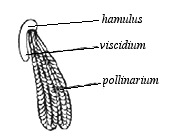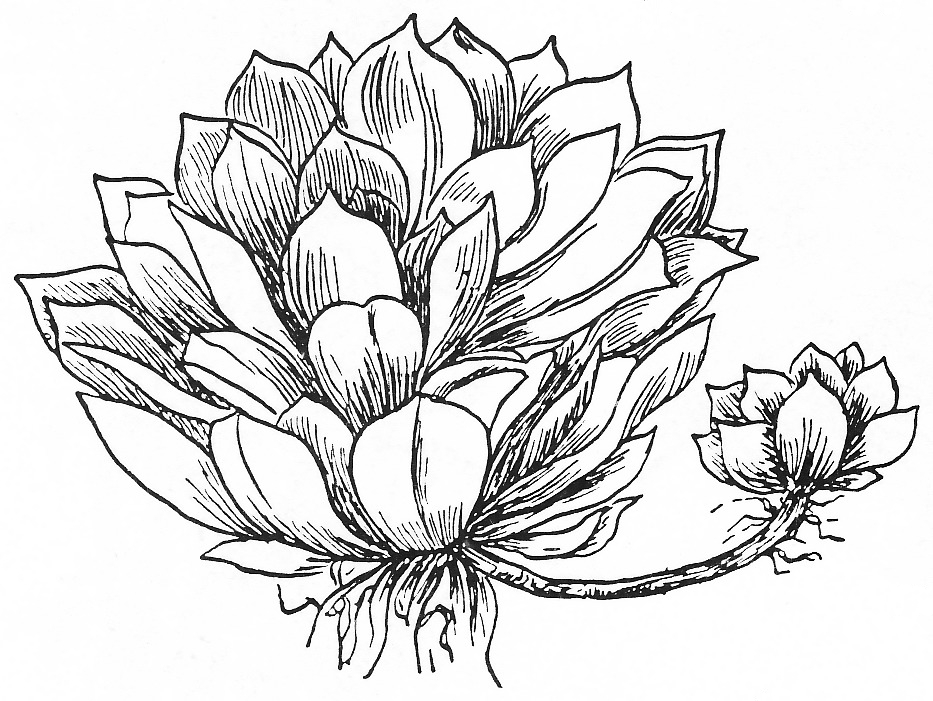hab·it (hab´it) n. general or characteristic growth form of a plant, or of a particular organ. [ME < OF < L habitus condition, state < habere have]
hal·o·phile (hāl´ə fīl´) n. adj. —n. an organism which is able to grow in saline conditions, or to tolerate them better than others. —adj. of or pertaining to such an organism. [< F < Gk. álo ἁλὸς salt + philos φίλος loving] —hal´o·phil´ic, adj. —ha·loph´i·lous, adj.
ha·ma·dry·ad (ham´ə drī´ad) n. -dry·a·des. a spirit which dwells in a particular tree, and would die if that tree dies; wood nymph. [ME < L hamadryas < Gk. hamadryas αμαδρυας < hama αμα with + drys δρῦς tree]
ham·u·lus (ham´ū ləs) n. -lus(-lüs). in the flowers of familia Orchidaceae, a minute uncinate tip of the rostellum, to which the pollinium is attached. [< L hamulus small hook]
Hanging Gardens of Babylon n.pl. a series of terraced gardens constructed in ancient Babylon, probably during the reign of Nebuchadnezzar II (ca. 570BCE), and which were renowned as one of the seven wonders of the ancient world. They were irrigated by water pumped from the Euphrates River.
hap·a·xan·thy (hap´ə zan´thē) n. the production of fruit a single time before dying; monocarpy; semelparity. [< Gr. hapaxanthos ἅπαξανθος fruiting only once (< hapax ἅπαξ once + antheō ἀνθέω to blossom) + E -y (< OF -ie < L -ia suffix indicating condition or quality)] —hap´a·xan´thic, adj.
hare·bell (hār´bel) n. any of numerous species from the genus Campanula L. (especially C. rotundifolia L., of the Campanulaceae) which bear racemes of blue campanulate flowers; bluebell. [ME]
hart·clo·ver (härt´klō´vər) n. an erect annual or biennial herb (Melilotus Mill., of the Fabaceae: Papilionoideae), bearing trifoliate leaves and a loose erect raceme of yellow or white flowers; melilot; sweet clover.
hart·root (härt´rüt´) or hart’s-root n. an European perennial herb (Libanotis pyrenaica (L.) O.Schwarz var. libanotis (L.) Reduron, of the Apiaceae), bearing small white flowers in dense umbels, as well as a stout taproot; moon carrot.
hart’s-eye n. dittany; hart-thorn.
hart-thorn n. 1 dittany; hart’s-eye. 2 buckthorn.
har·vest·ry (här´vis trē) n. -ries. 1 the act of harvesting or reaping, sensu lato. 2 that which is harvested, or the crop. [< OE hærfest harvest + ME -rie (< OF -erie a practice or occupation)]
he·li·co·ra·di·an (hel´ə kō rad´ē ən) n. in the screenplay Avatar, written by James Cameron, a 2.5-metre-high spiral plant capable of quickly withdrawing into a basal sheath through seismonasty. These plants closely resemble actual marine polychaete worms (phylum Annelida, classis Polychaeta, ordo Sedentaria, subordo Serpulimorpha). [NL < Gk. helikos ἑλικός spiral + L radius ray, spoke + -anus one who]
hel·leb·o·rine (hel´əb ə rīn´) n. adj. —n. a woodland orchid belonging to either of two genera: Epipactis Zinn or Cephalanthera Rich. (both of the Orchidaceae), generally on calcareous substrates or dunes, lacking a basal rosette of leaves and bearing a cleft lip in flower with distinct proximal (hypochile) and distal (epichile) portions. —adj. of or pertaining to an orchid of these 2 genera. [< F < L < Gk. helleborinē ἑλλεβορίνη plant like hellebore]
he·lo·bi·an (hē lō´bē ən) adj. 1 of or pertaining to plants of the obsolete orden Helobiae (now superorden Alismatidae). 2 of an evolutionary hypothesis suggesting that certain monocots of the Alismatidae bearing trinucleate pollen, flowers with numerous spiral anthers and pistils, and also seeds lacking endosperm, are most closely related to and derived from dicot familia Nymphaeaceae and/or Ranunculaceae. —n. a plant or taxon of the obsolete orden Helobiae (now superorden Alismatidae). [< Gk. helos ἕλος marsh + bios βίοͅς life + L -anus belonging to]
he·lo·phyte (hē´lō fīt´) n. 1 any herb of marshes. 2 any herb which bears its perennating buds in mud; a type of cryptophyte. [NL < Gk. helos ἕλος marsh + phyton φυτόν plant]
hem fir n. a term much used in construction in western North America for the wood taken from any combination of: Abies amabilis Douglas ex J.Forbes, A. concolor (Gordon & Glend.) Hildebr., A. grandis (Douglas ex D.Don) Lindl., A. magnifica A.Murray bis, A. procera Rehder, or Tsuga heterophylla (Raf.) Sarg. (all of the Pinaceae). They share an easily-interchangeable light-coloured softwood which is of use in construction for framing, flooring, and as pulp.
he·pat·i·col·o·gist (he pat´i kol´ə jist) n. one who studies liverworts and/or hornworts. [NL < Gk. hēpatikos ἡπατικός liverwort + logos λόγος word or discourse + -istēs -ιστης to be skilled in] —he·pat´i·col´o·gy, n.
her·ber (hėr´bėr or ėr´bėr) n. a pleasure garden; a green space enclosed within a hedge. [< OF herbier < LL herbarium]
Hercynian forest (hėr sin´ē ən) n. a large preternatural old-growth forest of central Europe, perceived of as stretching along the Danube and Rhine Rivers from roughly present-day Switzerland to Romania. Portions remain, known as the Black Forest, the Carpathians, and the Bohemian forest. Its composition was mixed, although oaks would have been a component, and it was known habitat for bisons, aurochs, moose, and other large mammals. [< L hercynia silva name given to the entire region by Julius Cæsar (100-40BCE) < Celtic perkuniā < *perkʷu- oak]
het·er·o·e·cious (het´ə rō ē´shəs) adj. a term used of parasitic rust fungi which produce some portion of their sporulation upon two distinct host species. [NL < Gk. heteros ἕτερος different + oikiā οικία dwelling + L -osus-ōsus prone to] —het´er·o·e´cism, n.
hick·o·ry (hik´ə rē) n. 1 any of several tree species of the genus Carya Nutt. (of the Juglandaceae), native to North America, bearing a hardwood useful for woodwork and as an aromatic fuel, and bearing edible nuts. 2 the wood of these species. 3 a stick taken from these trees or shrubs. —adj. of or pertaining to hickory. [< American E pohickery < Algonquian paycohiccora milky beverage prepared from hickory nuts]
high tea n. Esp.Brit. a meal in the late afternoon or early evening, at which tea is commonly served with a variety of light foods, including a cooked dish. It is both a meal and a social celebration.
hill·ock (hil´ək) n. a small rounded hill; hummock; tummock; tump. [< OE hyll hill + -oc dim. suffix]
hind·heal (hīnd´hēl´) n. an upright herb (Tanacetum vulgare L., of the Asteraceae) native to northern Europe, from 3-5dm in height, bearing pinnately-lobed leaves and with a branching raceme of yellow discoid capitula at its apex; tansy. While toxic, it has been used for its stimulant and tonic properties. [< OE hyndhale, hyndale < hind red deer doe + hǽlo, hǽlu, hǽl healing, cure]
hind·ber·ry (hīnd´bãr´ē) n. Obs., northern dial. raspberry. [OE hindberie < hind red deer doe + berie berry; so-called as growing in woods and assumed to be part of the diet of hinds]
hog·wort (hog´wôrt) n. an herb (Croton capitatus Michx., of the Euphorbiaceae), native to North America, and of some medicinal use as a natural laxative.
ho·ja san·ta (ō´Hə sän´tə) n. a climbing shrub native to Mexico (Piper auritum Sieber ex Kunth, of the Piperaceae), bearing numerous cordate leaves used for flavouring; yerba santa. [< Sp. hoja santa sacred leaf]
-holm (hōm or hülm) comb.form., suffix. 1 low-lying flat ground by a river or stream; water meadow. 2 small island in a river or lake. [OE < ON holmr]
holy basil n. an herb used as an herbal tea (Ocimum sanctum L., of the Lamiaceae), cosmopolitan in suitable tropical habitats; tulsi.
hom·i·ny (hom´ə nē) n. corn roughly hulled and pounded, then mixed with water and milk to boil as food. [? < Algonquian appuminéonash parched corn < apwóon he bakes or roasts + minneash fruit, grains, berries; alternate possibility < Algonquian uskatahomen that which is treated]
hone·wort (hōn´wôrt´) n. 1 a wild parsley of western Europe (Petroselinum segetum W.D.J.Koch, of the Apiaceae), bearing simple pinnate leaves and tiny white-flowered umbels; corn parsley. 2 any of several other umbelliferous perennial herbs of northwest Europe (among them Trinia glauca Rchb., of the Apiaceae, which bears tiny white flowers in compound umbels, and has thrice-pinnate leaves). [< ME hone tumour or swelling + OE wyrt plant]
horse- comb.form., prefix. in names of plants, denotes coarse or large species, or else those eaten by horses.
horse bean n. a variety of the common broad bean (Vicia faba L. var. equina Pers., of the Fabaceae: Papilionoideae); faba; fava bean.
horse·rad·ish (hôrs´rad´ish) n. 1 an European ruderal herb (Armoracia rusticana P.Gaertn., B.Mey. & Scherb., of the Brassicaceae), bearing oblong leaves suggestive of dock, and a swollen taproot which can be grated to prepare an edible pungent sauce. 2 the pungent sauce prepared from this root. [< E horse strong, large, coarse + OE rædic (< L radix, -icis root)]
hor·tor·i·um (hôr´tôr´ē əm) n. -i·a. the physical location of a cultivated kitchen garden or pleasure garden. [L hortorium < hortus garden + -orium the place of a thing]
house·leek (hous´lēk´) n. 1 a succulent herb native to Europe (Sempervivum tectorum L., of the Crassulaceae), and whose ability to grow upon walls and roofs has resulted in its perceived association with resistance to weather effects. 2 any of numerous related species of this genus. [descriptive of its tendency to grow upon thatched roofs]
hum·mock (hə´mək) n. 1 a small area of treed or vegetated land rising above and within an adjacent bog or marsh. 2 a small rounded hill; hillock; tump. [< ME humm- (akin to hump, < Du. homp lump) + -ock dim. suffix] —hum´mock·y, adj.
hy·brid (hī´brid´) n. adj. —n. the sexual offspring of parents from distinct species, or other taxa. —adj. bred from parents of two distinct taxa. [< L híbrida offspring of mixed parents]
hy·bri·dise or hy·bri·dize (hī´bri dīz´) v. 1 breed, naturally or through horticultural aid, to produce a hybrid offspring. 2 actively and selectively cross. [< L híbrida offspring of mixed parents + LL -izāre verbal suffix (< Gk. -izein -ιζειν)] —hy´bri·di·sa´tion, n. —hy´bri·di·za´tion, n.
hy·bri·di·ser or hy·bri·di·zer (hī´bri dī´zėr) n. hybridist. [< L híbrida offspring of mixed parents + Gk. istēs ιστης to be skilled in]
hy·bri·dism (hī´bri dizəm´) n. the state or quality of being hybrid. [< L híbrida offspring of mixed parents + -ismus (< Gk. -ismos -ισμος state or quality)]
hy·bri·dist (hī´bri dist´) n. one who specialises in breeding hybrids, often for particular foliar, floral, or fructal characteristics; hybridiser; hybridizer. [< L híbrida offspring of mixed parents + Gk. istēs ιστης to be skilled in]
hy·bri·di·ty (hī bri´di tē) n. 1 the state or quality of being hybrid. 2 an instance or degree of this. [< L híbrida offspring of mixed parents + E -ity (< F -ité < L -itas noun suffix)]
hy·bri·do·ge·nous (hī´bri dod´jen əs) adj. 1 creating a hybrid. 2 of individual intermediate characters or character sets, deriving from a proven or proposed hybidity. [< L híbrida offspring of mixed parents + Gk. -genēs γενῄς born, produced + L -ōsus prone to]
hy·brid·par·ent (hī´brid pãr´ənt) n. 1 either of the presumed parent taxa of a hybrid taxon. 2 either of the parents of a hybrid organism.
hy·dro·cho·ry (hī´drō kHō´rē) n. the dispersal of seeds, or of other propagules, by means of water. This may correspond to simply floating upon open water, or utilizing available motion due to currents or river flow. [NL < Gk. hydōr ὕδωρ water + chōrizō χωρίζω separate, spread] —hy´dro·cho´rous, adj.
hy·po·nas·ty (hī´pə nas´tē) n. a response of plant organs to lateral growth, in which the cells of the inferior surface grow more quickly and cause the organ to bend upward. [NL < Gk. hypo ὑπό under, beneath + nastos ναστός pressed + -ikos -ικος ability] —hy´po·nas´tic, adj.
hys·sop (his´ǝp) n. 1 any herb of the largely Eurasian genus Hyssopus L. (of the Lamiaceae), bearing opposite leaves and violet flowers, and of use as a purgative. 2 any of several unrelated herbs and shrubs which may also be used as purgatives. [< OE hysope < L < Gk. hyssōpos ὕσσωπος]



